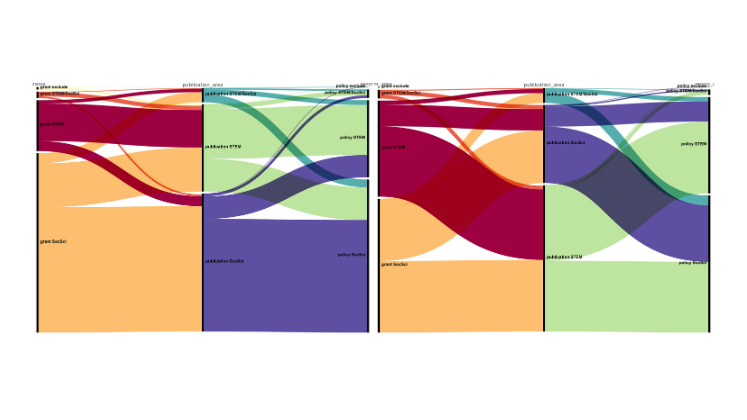The qualitative-quantitative debate, that has been a defining feature of social scientific research, has become a hinderance. Alex Gillespie, Vlad Glăveanu, and Constance de Saint-Laurent argue, in their new book ‘Pragmatism and Methodology’ (open access), that addressing our contemporary challenges requires seizing the opportunities of big qualitative data with methodological pragmatism.
The ‘classic’ methods we use today in psychology and the social sciences might seem relatively fixed, but they are the product of collective responses to concerns within a historical context. The 20th century methods of questionnaires and interviews made sense in a world where researchers did not have access to what people did or said, and even if they did, could not analyse it at scale. Questionnaires and interviews were suited to 20th century concerns (shaped by colonialism, capitalism, and the ideological battles of the Cold War) for understanding, classifying, and mapping opinions and beliefs.
However, what social scientists are faced with today is different due to the culmination of two historical trends. The first has to do with the nature of the problems we face. Inequalities, the climate emergency and current wars are compounded by a general rise in nationalism, populism, and especially post-truth discourses and ideologies. Nationalism and populism are not new, but the scale and sophistication of misinformation threatens to undermine collective responses to collective problems.
It is often said that we live in the age of ‘big data’, but what is less often said is that this is in fact the age of ‘big qualitative data’.
The second trend refers to technology and its accelerated development, especially the unprecedented accumulation of naturally occurring data (digital footprints) combined with increasingly powerful methods for data analysis (traditional and generative AI). It is often said that we live in the age of ‘big data’, but what is less often said is that this is in fact the age of ‘big qualitative data’. The biggest datasets are unstructured qualitative data (each minute adds 2.5 million Google text searches, 500 thousand photos on Snapchat, 500 hours of YouTube videos) and the most significant AI advances leverage this qualitative data and make it tractable for social research.
These two trends have been fuelling the rise in mixed methods research. The ‘paradigm wars’ of the 80s and 90s, with their either/or approach to qualitative and quantitative methodologies (reinforced by fundamentalist constructionist and realist epistemological stances) are coming to an end. The challenges we face are too great to be naively tackled with a toolkit limited by ideological commitments to this or that paradigm. While quantitative methodologies still dominate, it is unthinkable to promote the ‘superiority’ of one method to the exclusion of others. “It all depends on the question” is a mantra that students and scholars within the social sciences are increasingly familiar with; but which methods are suited to which questions? And how can these approaches be combined to do social research that rises to contemporary challenges?
While quantitative methodologies still dominate, it is unthinkable to promote the ‘superiority’ of one method to the exclusion of others.
Further complicating the issue, our contemporary social context for doing research foregrounds issues such as knowledge interests, types of data, analytical skills, and expected impact, among others. Research methods cannot be simplistically separated into categories anymore or judged based on generic outcomes, such as ‘discovering broad patterns’ (quantitative) or ‘examining local detail’ (qualitative). To address our contemporary complex challenges, and seize the opportunities of big qualitative data, we need methods that enable us to do both at the same time.
There is a name for such an approach: methodological pragmatism. Pragmatism is a philosophy developed in the early 20th Century in the USA; born in the progressive optimism of a rising nation it focused on the potential of human action and advocated evaluating knowledge in terms of its consequences. But, despite having broad impact in psychology, education, and politics, the consequences of pragmatism were not fully worked through for social science methodology. Given the possibilities surrounding big qualitative data and advances in AI, the time is ripe for using pragmatism to navigate our current challenges and make the most of new opportunities. A pragmatist approach invites researchers to adopt pluralism and challenge dichotomies, to adapt methods to context and, above all, to think creatively about methodology. Pragmatism is inclusive, because methods are not evaluated in terms of their epistemology, but in terms of what they contribute to the challenge at hand.
a pragmatist analysis of qualitative and quantitative research questions and contributions reveals that qualitative and quantitative data are inextricably bound together
More narrowly, a pragmatist analysis of qualitative and quantitative research questions and contributions reveals that qualitative and quantitative data are inextricably bound together: all data begins as qualitative, and the real issue is how much standardisation should be imposed given the purpose. Why can’t we simultaneously see how much people agree with an issue (a traditional survey question) with what they actually think about the issue (a traditional qualitative approach)? With advanced text analysis of the abundant qualitative data circulating in contemporary society, it is possible to do both at the same time (score agreement and view comments). Such deep integrations of qualitative and quantitative methods are increasingly possible and will increase social researchers’ ability to do research that is robust, valid, and useful.
Methodological pragmatism presents us with an open invitation to rethink methods not as isolated sets of procedures used to uncover ‘true knowledge’ but as tools we co-create and use in order to expand our possibilities for thinking and acting in our contemporary environment of complex problems and burgeoning big qualitative data. The pragmatist approach challenges us, above all, to not only observe the world as it is, but to change it through imagining it as it could be. In short, pragmatism provides a framework to help researchers to lean into the future, to critically reflect on knowledge and the interests being served, and thus address our contemporary challenges and through seizing contemporary opportunities.
‘Pragmatism and Methodology: Doing Research that Matters with Mixed Methods’ is published open access by Cambridge University Press.
The content generated on this blog is for information purposes only. This Article gives the views and opinions of the authors and does not reflect the views and opinions of the Impact of Social Science blog (the blog), nor of the London School of Economics and Political Science. Please review our comments policy if you have any concerns on posting a comment below.
Image Credit: Mitul Grover via Unsplash.







